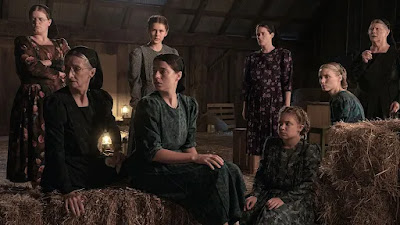“Women Talking,” however, is not merely provocative, but radical too. That radicalism manifests itself in the context, which Polley gradually doles out through various narrative details. The setting is a religious community somewhere in rural Canada in which its women have been from forbidden from learning to read and write and piety has become a cover for systemic sexual abuse committed by the colony’s men against its women. As the movie opens, one of the men has been hauled away to jail, prompting the rest of the men to go and bail him out, leaving the women all alone and suddenly presented within the opportunity to escape. Rather than simply pick up and go, they sit down in the hayloft of a barn and debate whether they should. That the women have been literally silenced for so long marks the very sound of their voices, then, as revolutionary. The film’s drama is not so much in will they or won’t they go as it is in the conversations themselves, recorded by the one male, August (Ben Whishaw), left behind. These minutes apparently functioned as the book’s narrative hook, but on screen they undergird events with a sense of momentousness, for posterity but also for the future.
That’s where “Women Talking” points, or at least looks, toward the future, evinced in the conservative holdout, the appropriately named Scarface Janz (France McDormand) who walks out on this spur of the moment debate not long after it begins. If it removes potentially the biggest source of dramatic conflict within the discussion, it achieves its intended effect, nevertheless, spiritually burying outmoded ideas in the past and leaving them there to rot. And though on first glance the principal characters might appear one-dimensional, the performers find nuance within. Ona can sometimes suggest an oddly sunny diplomat given the circumstances, but Rooney Mara evinces a sense of weariness too, while Claire Foy’s anger as Salome never feels archetypal but earned, deserved, understandable, how the hell else would she feel? And Jessie Buckley invests Mariche with a low-key fear of the unexpected.
It's only Foy, though, that I think captures the larger truth, of something bubbling within for a long time, of the liberation inherent in finally being allowed to speak. Then again, the exactness of the dialogue also epitomizes a sense of conversations these women might have been having in their own heads for a long time. Those conversations touch on innumerable subjects, none more moving than one’s adherence to faith and whether that faith is compromised or ruled entirely out of order when it is manipulated so heinously, an idea Polley brilliantly brings to life in the movie’s very first shot, the camera above and looking down on a bruised woman in bed. It’s a God’s eye shot, suggesting, without resolving, an absence of God, an indifferent God, or maybe a God that is still there despite it all, keeping watch, and evocative of how great “Women Talking” can be when Polley’s visuals underline or manifest the words. That, however, is not always the case.
The movie’s ugly, brown, and washed-out color palette, putting me in the mind of Spike Lee deliberately and boldly screwing up the aspect ratio in “Crooklyn” for an extended passage to make its characters appear weirdly stretched out, imbues a pointed lack of comfort to put you in the shoes of its characters. Even so, a sense of theatricality can creep in, as if Polley treats with the words with such sanctity she simply doesn’t want to get in their way. That has the unfortunate effect of sometimes rendering this hayloft as a lecture hall rather than a living, breathing space. When everything clicks, though, the power is acute, like August telling Una that it doesn’t matter what he thinks. “Is that true?” she follows up. “Do you really think it doesn’t matter what you think?” As she asks, the camera cuts to a shot over his shoulder, providing a sense of the space between them, a woman and a man, which in that moment feels never-ending.





No comments:
Post a Comment